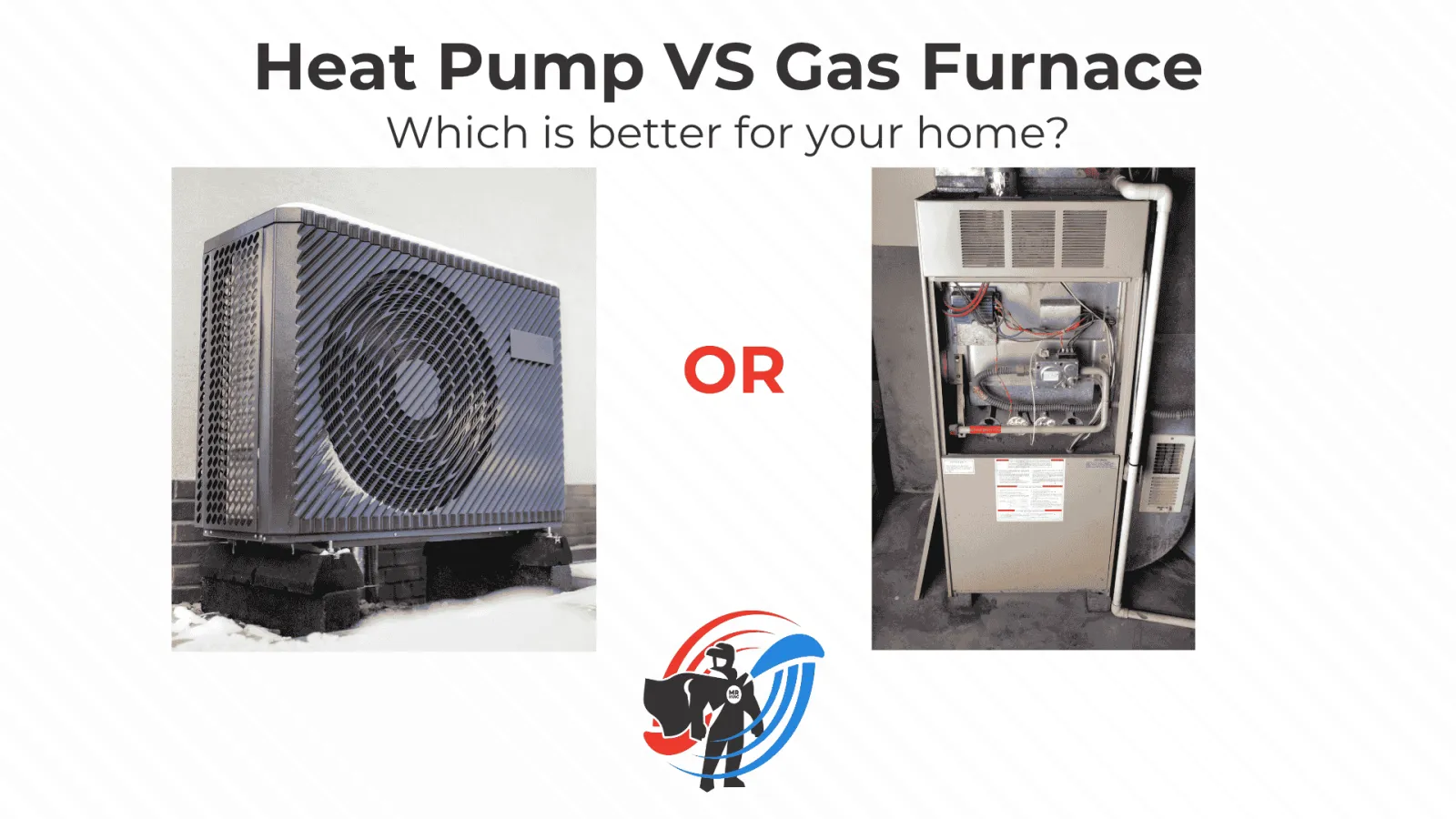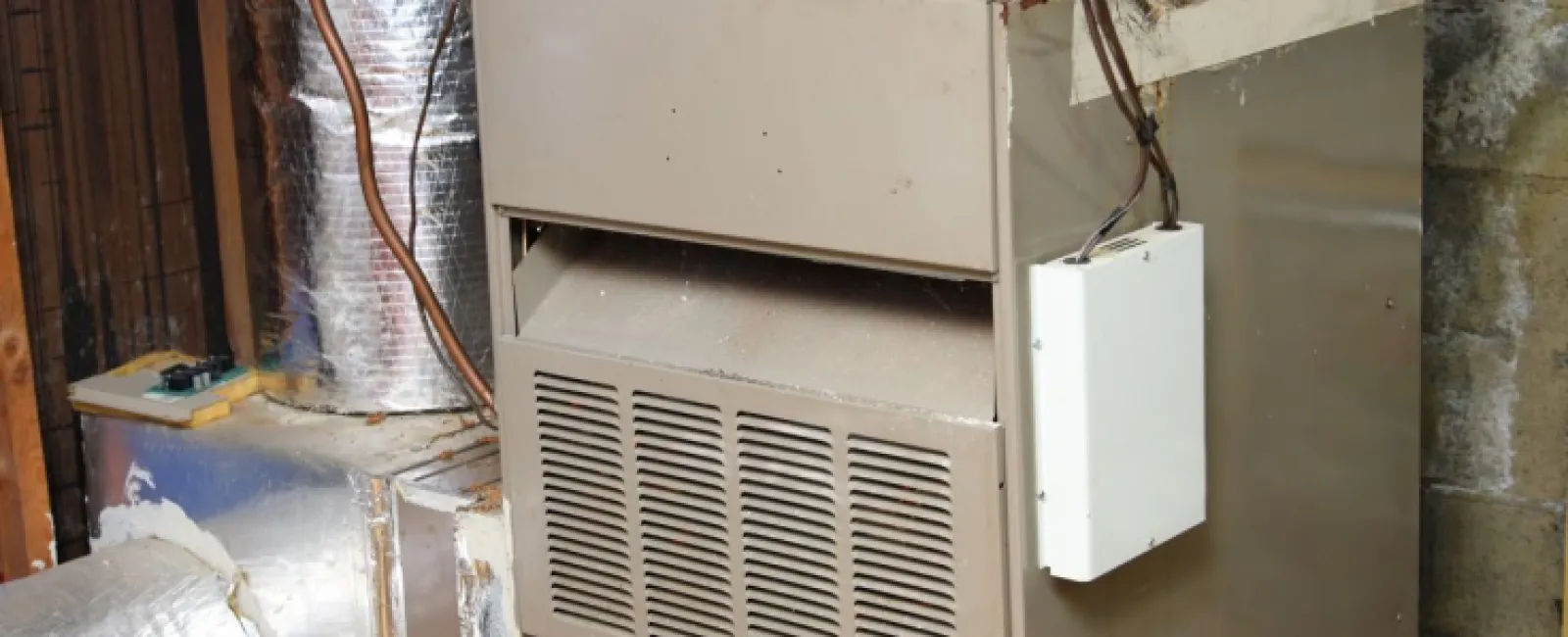November 06, 2025
Choosing between a heat pump and a gas furnace is one of the most important decisions you'll make for your home's comfort and energy costs. Both systems heat your home effectively, but they work in completely different ways and perform differently depending on your climate, home setup, and heating needs.

Understanding the real differences between these two heating systems will help you make an informed choice for your specific situation. Let's break down how each system works, its efficiency ratings, operating costs, and which one makes the most sense for your home.
How Gas Furnaces Work
A gas furnace generates heat through the combustion process. When your thermostat calls for heat, the furnace ignites natural gas or propane in a combustion chamber. This creates hot exhaust gases that pass through a heat exchanger, warming the air that your blower fan circulates throughout your home.
Gas furnaces are rated by their AFUE (Annual Fuel Utilization Efficiency) rating. This percentage indicates how much of the fuel is actually used to heat your home versus being lost as exhaust. A standard efficiency furnace operates at 80% AFUE, meaning 80% of the gas you pay for is converted into heat, while 20% exits through the flue pipe.
High-efficiency models reach 95% to 98% AFUE, wasting very little fuel. These condensing furnaces extract so much heat from combustion that water vapor in the exhaust condenses, requiring a drain line. Regular furnace maintenance keeps these systems running efficiently and safely year after year.
Advantages of Gas Furnaces
Gas furnaces deliver powerful, consistent heat that feels "hot and toasty" even when outdoor temperatures drop into the teens or lower. Natural gas costs remain relatively low in most areas, making furnaces a cost-effective option during the peak heating season. If your home already has a gas line connection, installation costs remain reasonable since the infrastructure is already in place.
Disadvantages of Gas Furnaces
The powerful heat from gas furnaces can create hot and cold spots throughout your home, especially with oversized systems. The dry, intense heat exacerbates winter skin problems and dries out nasal passages, often necessitating the use of whole-home humidifiers.
Gas furnaces waste energy at mild temperatures. When the temperature outside is 50°F, running a combustion system designed for zero-degree weather is inefficient. Safety matters too; gas furnaces produce carbon monoxide during operation, making proper installation and regular furnace maintenance essential to prevent dangerous CO buildup.
How Heat Pumps Work
A heat pump doesn't generate heat through combustion. Instead, it moves heat from one place to another, much like your refrigerator, but in the opposite direction. Even when outdoor air feels cold, it contains thermal energy that a heat pump can extract and transfer indoors.
The outdoor unit contains refrigerant that absorbs heat from outside air. A compressor pressurizes the refrigerant, further raising its temperature. The hot refrigerant travels to the indoor air handler, where it releases heat into the air supply of your home. A fan distributes this warmed air through your ductwork.
Heat pumps measure efficiency using the Heating Seasonal Performance Factor (HSPF). Higher numbers indicate better efficiency. Modern heat pumps typically rate between 8 and 13 HSPF, with the best models achieving even higher ratings.
Professional heat pump installation ensures a proper refrigerant charge and optimal airflow, both of which are critical for efficient operation.
Advantages of Heat Pumps
Heat pumps excel at efficiency during mild winter weather. When outdoor temperatures stay in the 40s and 50s, a heat pump moves heat for a fraction of the energy cost of generating it through combustion. Modern heat pumps operate effectively down to 5°F or lower, maintaining heating capacity that older models couldn't match.
Since heat pumps don't use combustion, they produce no carbon monoxide. There's no heat exchanger to crack, no gas lines to leak, and no combustion byproducts to vent. The gentler heat causes less indoor air dryness, often eliminating the need for supplemental humidity. Heat pumps also provide air conditioning in summer, giving you year-round climate control from a single system.
Disadvantages of Heat Pumps
Heat pump performance drops as outdoor temperatures fall. Below 25°F to 35°F, depending on the model, efficiency decreases significantly. Most heat pumps rely on electric resistance heat strips as backup in very cold weather. These strips work like a giant toaster, providing warmth but consuming enormous amounts of electricity.
The air from the heat pump vents feels cooler than the air from the furnace, even though it heats your home to the same temperature. Some people find this uncomfortable, preferring the blast of hot air from a gas furnace. Homes without existing ductwork face higher installation costs, and proper heat pump installation and repair by experienced technicians ensures optimal performance.
Heat Pump vs Gas Furnace: Efficiency Comparison
A 95% AFUE furnace converts 95% of fuel into heat. A heat pump with 10 HSPF produces 10 BTUs of heat for every watt-hour of electricity consumed. These different metrics make direct comparison complex, but real-world performance tells the story.
In mild weather (40°F to 60°F outdoors), modern heat pumps typically outperform gas furnaces in terms of energy efficiency. The heat pump moves existing heat rather than generating it, using less total energy. In very cold weather (below 30°F), gas furnaces become more efficient as heat pumps struggle and resort to backup heat. Your actual efficiency depends heavily on climate; mild winters favor heat pumps, harsh winters favor furnaces.
Operating Cost Comparison: Heat Pump vs Furnace
Operating costs depend on local utility rates, climate, and usage patterns. Natural gas generally costs less per BTU than electricity; however, heat pumps can move multiple BTUs per unit of electricity, effectively closing the gap.
In mild winter regions with expensive natural gas, heat pumps usually cost less annually. In areas with severe winters and inexpensive natural gas, furnaces typically cost less since heat pumps often require expensive backup heat. Installation costs matter too; gas furnaces cost less upfront if you already have an existing gas service, but installing new gas lines can add thousands of dollars to the overall cost. Both systems require annual professional maintenance, although furnace maintenance includes specific safety checks for combustion and venting.
Climate Considerations: Which System Works Better Where?
Your local climate should heavily influence your decision. In southern states where winter temperatures rarely drop below 40°F for extended periods, heat pumps make excellent sense. You'll operate in the heat pump's most efficient range most of the winter.
In northern climates with prolonged sub-freezing temperatures, gas furnaces offer reliable and efficient heating throughout the season. Moderate climates present the most complex decision. If cold snaps are rare and most winter days stay above 35°F, either system can work well. Consider your heating habits; if you keep your thermostats low and bundle up, a heat pump can still work effectively even in occasional cold weather. If you maintain a temperature of 72°F all winter, a furnace might prove more economical.
Dual Fuel Systems: Combining Heat Pump and Furnace
Dual fuel systems pair a heat pump with a gas furnace, automatically switching between them based on outdoor temperature and efficiency. The system uses the heat pump for mild weather, then switches to gas heat when temperatures drop low enough that the furnace becomes more cost-effective.
This approach provides optimal efficiency across all temperatures; however, dual fuel systems are more expensive upfront, as they require the installation of both heating systems. If you don't already have gas service, running new lines adds significant expense. The efficiency gains might take years to recoup through lower utility bills. Dual fuel is particularly beneficial for homeowners who prioritize comfort and energy efficiency. You get cozy gas heat in peak winter and gentler heat pump warmth the rest of the season.
Making the Right Choice for Your Home
Choosing between a heat pump and a gas furnace comes down to your specific situation:
Choose a gas furnace if Winter temperatures regularly drop below 30°F for weeks, you already have gas service, you prefer intense hot air, or you live in a harsh winter climate.
Choose a heat pump if you rarely experience freezing temperatures, don't have gas lines, want year-round heating and cooling from a single system, or if environmental concerns are important to you.
Consider dual fuel if you want optimal efficiency across all conditions, already have a gas service, and the higher installation cost fits your budget.
Maintenance Requirements: Heat Pump vs Furnace
Both systems require annual professional maintenance. Gas furnaces need combustion safety checks, heat exchanger inspection, and flue verification. Heat pumps require refrigerant checks, coil cleaning, and electrical inspection. Since heat pumps run year-round for heating and cooling, they typically accumulate more runtime than furnaces.
Well-maintained furnaces commonly last 15 to 20 years. Heat pumps typically last 10 to 15 years due to year-round operation. Professional furnace maintenance and heat pump service significantly extend equipment life.
Which Heating System Should You Choose?
Heat pumps are a good choice for mild climates, homes without existing gas service, and homeowners who prioritize energy efficiency in moderate weather conditions. Gas furnaces remain the preferred choice for harsh winter climates, homes with existing gas infrastructure, and situations where consistent, reliable heat is essential. Dual-fuel systems offer a premium solution for optimal efficiency and comfort, provided the higher cost fits your budget. The right answer depends entirely on your climate, existing infrastructure, comfort priorities, and budget.
Get Expert Help Choosing Your Heating System
At MR. HVAC, we help homeowners make informed decisions about heating systems every day. Our licensed technicians have over 25 years of experience installing and servicing both heat pumps and gas furnaces. We'll assess your home, discuss your priorities, and recommend the solution that makes the most sense for your situation.
Whether you need heat pump installation and repair or professional furnace maintenance services, we provide honest, transparent service with upfront pricing and no pressure tactics. We're a family-owned business serving our local community, and we treat every customer like family.
Ready to upgrade your heating system or need expert advice on the best choice for your home? Contact MR. HVAC today for a free consultation. We'll help you stay warm and comfortable all winter long.
Frequently Asked Questions
Is a heat pump more efficient than a gas furnace?
Heat pumps are typically more efficient than gas furnaces when the outdoor temperature remains above 40°F. Below that threshold, efficiency depends on the specific heat pump model and outdoor conditions. Modern cold-climate heat pumps maintain efficiency down to much lower temperatures than older models. Gas furnaces become more efficient in very cold weather, especially when heat pumps must rely on backup electric heat strips.
Can a heat pump work in cold climates?
Yes, modern cold-climate heat pumps work effectively in temperatures well below freezing. Advanced models maintain heating capacity down to 5°F or lower. However, efficiency gradually decreases as temperatures drop. In regions with prolonged periods of temperatures below 20°F, a gas furnace or dual-fuel system may provide better performance and lower operating costs.
What is cheaper to run, a heat pump or a gas furnace?
Operating costs depend on local utility rates and climate. In mild climates with moderate electricity rates, heat pumps usually cost less to operate. In cold climates with access to inexpensive natural gas, furnaces are typically less expensive. Calculate your specific costs by comparing your local gas and electric rates, considering the number of heating degree days your area experiences, and factoring in your system's efficiency ratings.
Do heat pumps last as long as gas furnaces?
Gas furnaces typically last 15 to 20 years with proper maintenance. Heat pumps generally last 10 to 15 years. The difference stems from heat pumps running year-round for both heating and cooling, accumulating more operating hours than furnaces that only run during heating season. Regular professional maintenance significantly extends the life of both systems.
Should I replace my gas furnace with a heat pump?
Replacing a working gas furnace with a heat pump makes sense if you live in a mild climate, want to eliminate gas service from your home, or prioritize environmental concerns. If your furnace still functions well and you experience harsh winters, keeping the furnace or adding a heat pump for dual-fuel operation might be more practical. Consider your specific climate, utility costs, and whether your home will continue to use any gas appliances before making this decision.




